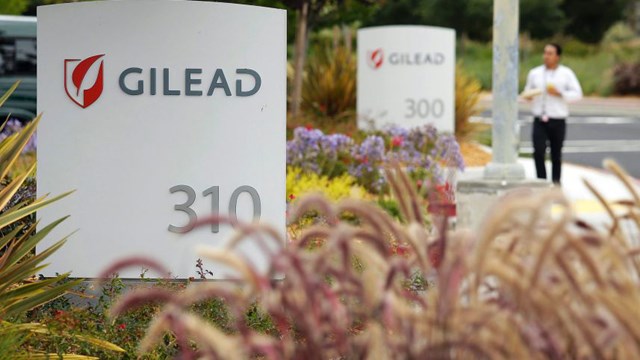The headquarters of Gilead Sciences in Foster City, California Credit: Eric Risberg, AP
Gilead Sciences agreed to 29 percent premium, which shrank fast in pretrading, despite biotech company Kite Pharma’s low revenues, heavy R&D spending, and losses
The almost $12 billion that Gilead Sciences agreed on Monday to pay for Kite Pharma is testament not only to Israeli innovation but also to the entrepreneurship of Kite’s Israeli founder and CEO, Prof. Arie Belldegrun, and his ability to leverage a vast store of medical knowledge and Wall Street connections.
Gilead said it had agreed to pay $11.9 billion in cash for Kite, which is based in Santa Monica, California and is developing immunotherapy-based cancer treatments. That came to $180 a share, a 29 percent premium on Kite’s share price even after a strong run this year.
The gap was quickly closed with Kite shares soaring 28 percent in Nasdaq trading to $178.24.
Kite’s core technology, called eACT, was developed by Weizmann Institute of Science immunologist Prof. Zelig Eshhar together with Dr. Steven Rosenberg of the U.S. National Institutes of Health. Belldegrun bought the rights to the technology and built Kite around it.
A Weizmann and Hebrew University Medical School graduate, the 67-year-old Belldegrun moved to Los Angeles at the start of his career and met Rosenberg when they were both researchers at the NIH.
While Belldegrun is a professor at the University of California Los Angles and has wide medical interests, he is first and foremost an entrepreneur, founding and selling three startups in the past decade. They include Agensys, which he sold to Astella for $537 million in 2007, and Cougar, sold to Johnson & Johnson for $1 billion.
Acquiring the rights to eACt was a complicated affair, involving four sellers: the two developers plus the commercialization arms of Weizmann and the NIH. Once he did, however, Belldegrun knew how to market its potential to investors. He raised $1.1 billion in four share offerings, starting with a 2014 initial public offering.
Kite specializes in developing treatments custom-made to target a patient’s cancer. Called CAR-T, this type of therapy involves removing immune cells from a patients’ blood, reprogramming them to create an army of cells that can zero in on and destroy cancer cells and injecting them back into the patient.
“[Kite’s] work has opened a clear path towards the potential cure for lymphoma patients who’ve run out of options and are desperately in need of treatment,” Gilead CEO John Milligan said after the deal was announced.
Gilead was willing to pay such a premium for Kite out of necessity: The U.S. company has top-selling treatments for the HIV and hepatitis C viruses, but sales for both products are falling and its push into oncology has gone slowly.
Analysts said acquiring Kite would help turn Gilead into a leader in so-called cellular therapy and provides an opportunity to diversify revenue. Kite’s flagship drug, axi-cel, is up for approval in Europe and the United States. Kite is expected to get an answer from the U.S. Food and Drug Administration in November regarding its CAR-T treatment for a type of blood cancer called aggressive B-cell non-Hodgkin lymphoma.
Clinical trials, whose results were released in February, showed that out of 101 patients, 36 percent had a complete response to the treatment after six months. Analysts predict axi-cel would have worldwide sales of $1.7 billion in 2022, according to EvaluatePharma.
“It’s a completely fair price. They probably didn’t haggle a lot and Gilead offered them what was appropriate,” Corey Davis, an analyst at H.C. Wainwright & Company, told Bloomberg News.
However, Kite-Gilead face competition. The giant drug maker Novartis is developing its own CAR-T treatment and earlier this summer, an FDA panel voted unanimously in favor of the leukemia treatment.
The biggest profits from the Kite sale will go to American investors. Kite’s biggest shareholder is the U.S fund Capital group, which holds 19.9 percent of the company, followed by Rowe Price Group with 9 percent. The biggest Israeli stockholder is Menorah Insurance, with a 2 percent stake worth $222 million and the Migdal Insurance group with a $26 million holding. Eshhar and Werizmann will enjoy royalties when commercial sales of axi-cel begin.
The deal is expected to be completed in the fourth quarter, the two companies said.

